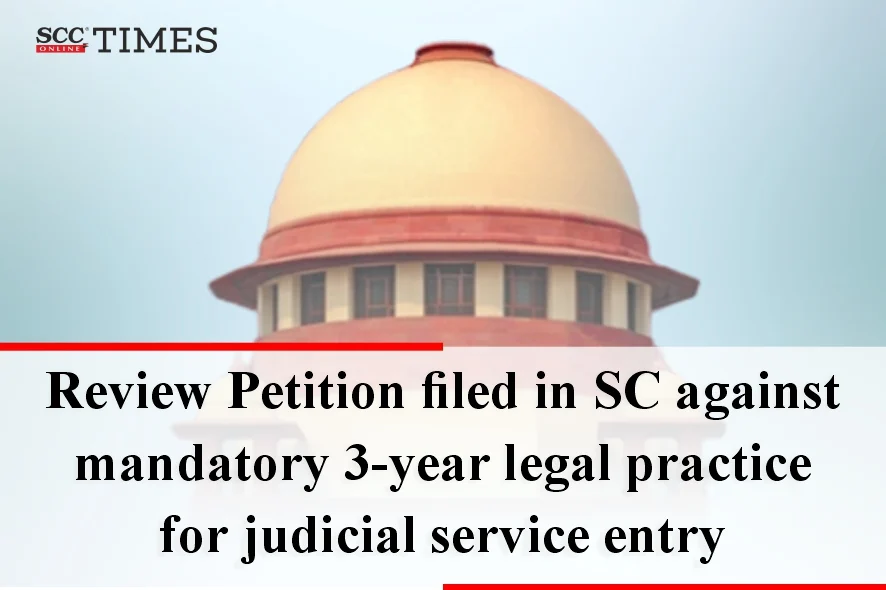Supreme Court: A review petition has been filed against the Supreme Court’s decision in All India Judges Assn. v. Union of India, 2025 SCC OnLine SC 1184 requiring mandatory 3-year legal practice to be eligible for Civil Judge (Junior Division) recruitment.
A practicing advocate, enrolled with the Bar Council of Uttar Pradesh and an aggrieved judicial service aspirant filed the review petition on the grounds that his fundamental rights under Articles 14 and 16 of the Constitution of India stands infringed due to the imposition of an arbitrary and unreasonable condition of mandatory three years’ practice at the Bar, as directed in the impugned judgment, thereby adversely affecting the petitioner’s right to equal opportunity and fair access to public employment.
The petitioner was particularly aggrieved by the Direction No. 7 of the impugned judgment-
“All the High Courts and the State Governments in the country shall amend the relevant service rules to the effect that candidates desirous of appearing in the examination for the post of Civil Judge (Junior Division) must have practiced for a minimum period of 3 years to be eligible for the said examination. To fulfill the said requirement, the Rules shall mandate that the candidate produces a certificate to that effect duly certified either by the Principal Judicial Officer of that Court or by an advocate of that Court having a minimum standing of 10 years duly endorsed by the Principal Judicial Officer of such a District or a Principal Judicial Officer at such a station. Insofar as the candidates who are practicing before the High Courts or this Court, they shall be certified by an advocate who has a minimum standing of 10 years duly endorsed by an officer designated by that High Court or this Court. We further direct that the experience of the candidates which they have gained while working as Law Clerks with any of the Judges or Judicial Officers in the country should also be considered while calculating their total number of years of practice. The Rules shall also mandate that the candidates who are appointed to the post of Civil Judge (Junior Division) pursuant to their selection through the examination must compulsorily undergo at least 1 year of training before presiding in a Court.”
It was submitted that the mandatory 3-year legal practice rule should be implemented only from 2027 onwards to avoid unjust exclusion of recent graduates (2023—2025) who prepared under the previous eligibility criteria. Immediate enforcement causes retrospective hardship, violating principles of fairness, legitimate expectation, and equal opportunity under Article 14 of Indian Constitution.



One should not be punished for the mistakes of others. The issue currently faced in the lower judiciary—where some Junior Civil Judges (JCJs), despite undergoing training after selection, fail to understand basic court procedures—is not merely a failure of the selected candidates. Rather, it reflects a systemic shortcoming and the inadequacy of the training imparted by the Judicial Academies.
Unfortunately, the consequence of this institutional failure is now being unfairly borne by aspiring judicial officers who have not yet even entered the system. These innocent candidates—many of whom have dedicated years of relentless and unrecognized effort to prepare for judicial service—are being punished by a rule that requires three years of prior legal practice before appearing for the exam.
In my opinion, it is the training institutions that require reform—not the students who are yet to become part of the system. The idea of ‘punishing’ these institutions does not imply retribution, but rather constructive reform—such as extending the training duration, modernizing the curriculum, or improving practical exposure.
I sincerely hope that the highest constitutional authorities will recognize this and ensure that the fundamental rights of innocent, aspiring judicial candidates are not compromised in the name of systemic correction.
Bar council exams after becoming advocate that is after enrolment is not proper it is most of the advocates feel. Painful also.Suppose he does not pass exam within the period he has to lose his practice .so that he is losing right to live.whatever exam that is be conducted prior to enrolment is better
Three years practice as a Advocate before appearing For judicial exam is necessary. Further certificate of practice ,taking affidavit from the advocate and sending from bar association is suggested ,because appearance in the court, with any representation on behalf senior court may be taken into judicial notice .attending the court is itself has to be taken as practice .
The review petition must be dismissed outrightly. The quantum jump of pending cases in courts , inexplainable filing of appeals, reviews and revisions against trial court orders , large scale pendency n courts and over burdening of a higher appellate courts are all caused due to larger inexperienced and incompetent lower judicial officers , largely due to lack of practical experience , exposure to practical legal systems and interpretation of statutes , lack of exposure to general public, social and professional life and experiences which all leads to lack of understanding of issues pending trial